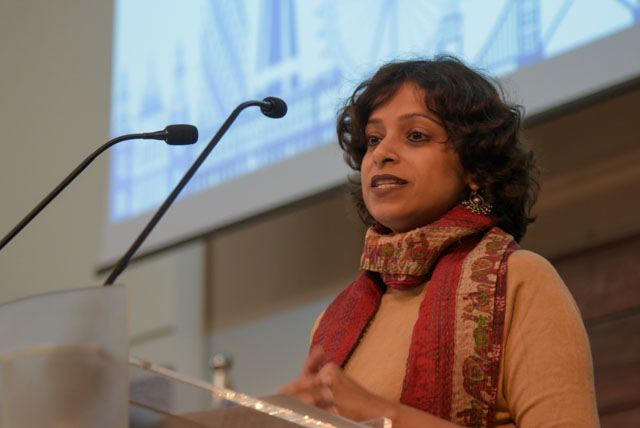Blog by Debra Joseph, SI Barbados
Divya is a Women’s Affairs Reporter for the BBC World News and award-winning journalist based in Delhi, India. She has been reporting on stories of women for over 15 years. She explores human rights and social justice issues with a gender lens.
Her presentation was entitled “From Fear to Fight Back”. It focused on violence against women and girls in India . She highlighted two cases of gang rape that occurred in Delhi in 2012 and in Manipur in 2023. In December 2012, a brutal gang rape took place in Delhi, India, which shocked the nation and garnered international attention. A 23-year-old paramedical student, often referred to as “Nirbhaya” (meaning “fearless” in Hindi) to protect her identity, was brutally assaulted by six men on a moving bus. The perpetrators not only raped her but also physically and sexually assaulted her. Despite extensive medical treatment, she succumbed to her injuries and passed away on December 29, 2012. This heinous crime sparked massive protests across India, demanding justice for the victim and highlighting the broader issue of gender-based violence. The outrage and public pressure eventually led to a significant overhaul of India’s rape laws and legal procedures, resulting in stricter punishments for sexual offenders. The case served as a catalyst for discussions on women’s safety, gender equality, and the need for societal change to combat sexual violence in India.
In Manipur 2023, a clip went viral showing two women said to be from the Kuki-Zo group walking naked along a street, being jeered and harassed by a mob. The video emerged more than two months after it was filmed due to an internet ban in Manipur since May 3. Protests were planned in several parts of India by rights groups demanding justice and swift investigations into the latest incident to raise questions about the safety of women in India.
Crimes against women in 2012 were 244,270 and in 2012-2021 was 428,278, up from 42% to 64%. This is according to the National Crime Records Bureau from the Government of India.
Some of the issues with the police in India with regards to crimes against women were:
- Police were not writing down the complaints from victims, thus there are no records of it happening.
- Caste and class issues that reduces the attention of the police to some rape victims.
Response from the Government
Introduction of the death penalty (main focus)
Some suggestions to assist in the future:
- Make police stations accessible and empathetic to women’s complaints.
- Have different courts available for fast track of cases. Presently, there is a lack of resources.
- Have awareness campaigns on domestic violence so that the public can be educated on the topic.
- Address rape within marriage. This was not taken up by the courts as it was difficult to prove. It was noted that Nepal recognized rape within marriage. This can be an example to follow with respect to the law.
There is a court handbook on ‘Combatting Gender Stereotypes’ (Supreme Court of India). This addresses the language, reasoning patterns and decisions and judgements with regards to domestic violence.
Before, the two-finger test was used to determine the extent of rape on victims. This was felt to be highly subjective and should cease with immediate effect.
Media Responses
In 2015, town hall meetings were held with women who attended various universities. There was also over-reporting of heinous crimes. It was found that too much focus was placed on the negative, when there were also positive interventions occurring. Thus, focus was shifted a bit to the fact that some victims had family support and family members stood by them. There were instances where the police took the report in writing and other cases where justice was done. It is so important to have a balanced outlook on domestic violence and what is actually happening instead of having skewed reporting. This helps to instill hope for victims and encourage them to come forward with respect to accessing help.
In 2022, a Helpline was set up for reporting of domestic violence. One of the victim’s mothers, created a Trust to assist others who would have experienced violence and provided pro bono help. Some activists covered themselves from head to toe with just their eyes exposed. The message they wanted to convey is that they did not want to be seen but they wanted their voices to be heard. It was a very sobering presentation and encouraged Soroptimists to continue to be a part of the movement to bring awareness to domestic violence.


